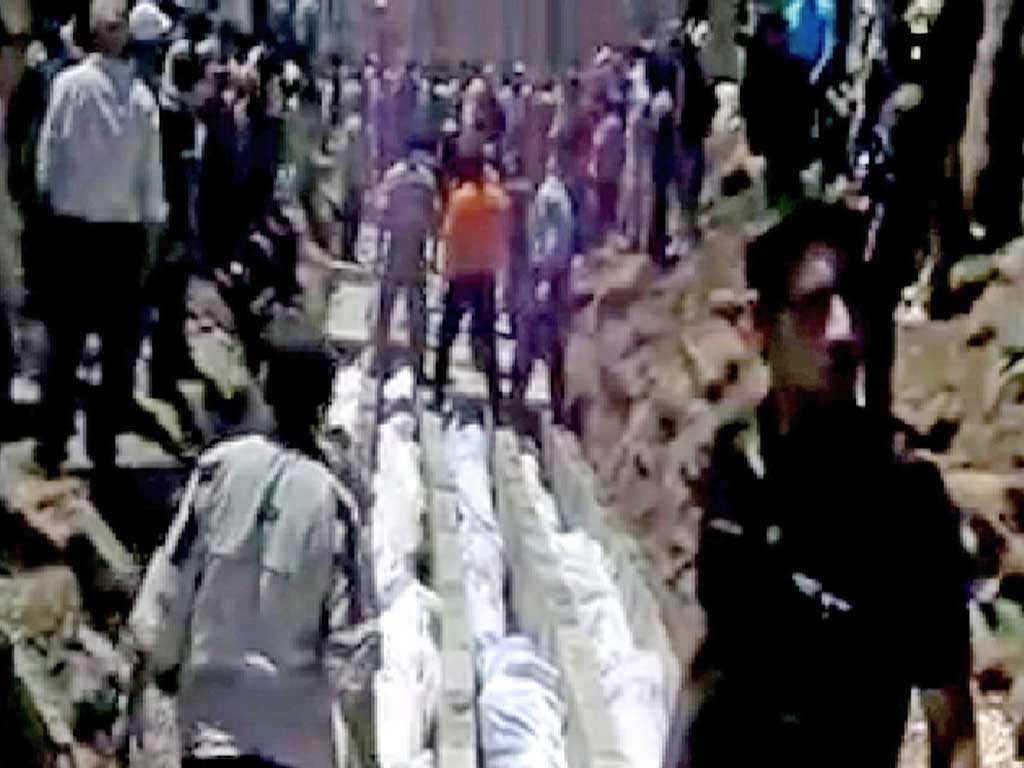UN condemns Syria after massacre of civilians
Emergency meeting of UN discusses response to attack that killed 34 children

The United Nations Security Council last night condemned the Syrian government "in the strongest possible terms" for heavy-weapon attacks on the town of Houla, where 108 people, and up to 34 children, were killed on Friday.
While the carefully worded statement stopped short of blaming anyone for the "close-range attacks" that killed many of the victims, the Council condemned "the killing of civilians by shooting at close range and by severe physical abuse".
The statement said the "outrageous use of force" against civilians violated international law and government commitments to cease violence, including the use of heavy weapons. The Syrian government denies responsibility for the massacre.
The Foreign Secretary, William Hague, was expected to ask Russia, Syria's only remaining major foreign ally, to put pressure on the regime to stop the killings. Kofi Annan, the UN-Arab League envoy, was also due for talks in Damascus.
Mr Hague said he was "absolutely sickened" by the recent deaths in Syria. "It is a familiar tactic of the Assad regime to blame others for what's happening in their country to try to get out of responsibility for the scale of the destruction," he said. The deaths "illuminate the type of tyranny that the people in Syria have been experiencing".
Mr Hague is due in Moscow today and is expected to urge the Russian Foreign Minister to take a much tougher stance over the human-rights abuses committed by the Assad regime. Russia and China have been the main opponents of stronger action against the Syrian government.
"It isn't in the interests of Russia, it's not in anyone's interests, for Syria to descend into an even bloodier situation and into a full-scale civil war, and that's now the danger," Mr Hague said.
Diplomats say Britain and France had proposed issuing a press statement condemning the killings, but Russia told Council members it could not agree and wanted to be briefed first by Major-General Robert Mood, who is heading the UN observer mission in Syria. Syria is once more facing diplomatic isolation. Mr Annan is due back in Damascus today for talks aimed at rescuing his foundering peace plan, which was agreed seven weeks ago.
The Syrian government denies its forces were responsible for the killings at Houla. But it has not produced a credible alternative explanation of what happened there to cast doubt on the claims of the opposition, largely confirmed by UN-ceasefire monitors, that the slaughter of at least 34 children and their parents was carried out by pro-government forces.
To survive, President Bashar al-Assad needs to avoid the international isolation which befell Libya. He also needs to prevent Syrians, and the world, from believing the fall of his regime is inevitable and they should avoid betting on a loser.
"How will Russia respond to this?" asked one foreign diplomat in Damascus yesterday. "That is the crucial question." Russia remains Syria's most important friend. It was Russian and Chinese vetoes at the UN Security Council in February that relieved Syria from the danger of foreign intervention similar to that which overthrew Colonel Muammar Gaddafi in Libya.
But Russia is paying a price for backing Syria, and this price will have been raised by the Houla killings. It may not want to be allied to a regime in a permanent state of crisis.
President Assad can look for longer-term support to Iran and, to a lesser extent, Iraq, both Shia powers. They see Syria as being targeted by the Sunni rulers of Saudi Arabia and Qatar.
The Iranians have been giving some economic aid to reduce the impact of sanctions. Hezbollah in Lebanon will also be loath to see its long-term ally in Syria go down. But the Iranians, whose foreign policy is normally cautious and devious, will not want to depend on the survival of President Assad. They will look for an accommodation with any successor government, though Iran still faces a serious strategic defeat. It will be losing its one important ally in the Arab world. It will lose much of its ability to play a role as a regional power.
The Syrian chargé d'affaires will be summoned to the Foreign Office today to hear Britain's condemnation of the Houla massacre, which the Syrian government denies.
Nick Clegg, the Deputy Prime Minister, said: "The scenes of savagery that we have seen on our television screens are revolting, stomach-churning." Mr Clegg and Alistair Burt, the Foreign Office minister, warned that Syrian officials may not be allowed into London for the Olympics.
Mowaffak Joumma, the chairman of the Syrian Olympic committee, last night said the Olympic charter forbade host nations from banning athletes. "Authority of any host country is limited to organising and offering all necessary facilities to all participating athletes," he said.
Subscribe to Independent Premium to bookmark this article
Want to bookmark your favourite articles and stories to read or reference later? Start your Independent Premium subscription today.

Join our commenting forum
Join thought-provoking conversations, follow other Independent readers and see their replies